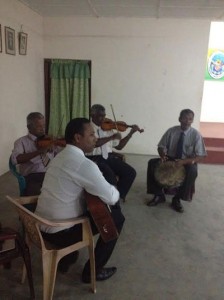A little bit of Creole and kaffringa to keep heritage alive in Batticaloa
BATTICALOA – In a tiny corner of Batticaloa’s vast eastern region, a group of children are studying the language of one of Sri Lanka’s three foreign invaders though it’s of no more use in this country.
German, French, Hindi or even Mandarin is fine but why Creole? To retain the culture, heritage and traditions of the Portuguese invaders, says a member of the Burgher community in Batticaloa, who are descendants of the Portuguese.
At the town’s Burgher Association Hall by the side of the lagoon famed for the mystical ‘singing fish’, a banner proudly has the year 1505 written over it.

Members of the band: from left: Terrance Sellar (guitar), Frederick Sellar (fiddle), Stephen Andrado (fiddle) and Edward Outschoorn (drums)
That’s the year the Portuguese landed in Batticaloa, says Terrance Sellar, a musician, singer, corporate executive and livewire of the Burgher community here.
Batticaloa Burghers are famous for the ‘kaffringa’ dance and Sellar and his colleagues put on a show for the Sunday Times during an evening visit, some months ago.
Girls wear long flowing dresses with nice ribbons tucked into their hair while the young men are handsomely dressed in black suits and white shirts.
As Sellar’s band strikes a note, the group of four couples get into a circle and off they go as the two fiddle players, a drummer with a rabana and a Spanish guitarist plays a series of songs – catchy tunes with a mix of Sinhala baila played to Portuguese lyrics.
They play “Yamman banda wesak balanna” or “Mee Wadayaki Jeevithey” of the Wally Bastianz and C.T. Fernando baila vintage with gusto with Portuguese lyricis blending with the original chorus.
As the Sun’s evening rays cut across the hall, the dancers form into circles and semi-circles singing along and keeping in sync with the band. The only tune missing: the singing fish!
During a break in the dancing, I sit down with Sellar and his elderly colleagues in the band – Frederick Sellar, Stephen Andrado and Edward Outschoorn – to understand their way of life and continuing the great traditions.
“Most of the songs we sing to Sinhala baila tunes with Portuguese Creole words,” says Sellar, the youngest in the quartet.
During traditional dances, Batticaloa Burgher men wore shirt, tie, jacket and trousers. While the dance form has a bit of the European cha cha and ballroom, it is rooted in the kaffringa.
Sellar says the association started in 1964 and now there are about 300 families in the district.
Burgher weddings here still follow customs and tradition prevalent through the ages. When the couple comes home from the church, there are special tunes that are played.
The couple also exchange spring flowers pinned on their clothes which signifies that they are married.
Other customs include “wake up music’ when the couple comes home to the place where they plan to settle down. The bride drinks a glass of wine while the groom take a sip of arrack.
Earlier wedding celebrations went on for three days but were reduced to one (day) owing to austerity measures and cost.
The wedding lunch is also special. At the table is the couple along with family and relatives. Speeches are normally in Portuguese but this is fading fast.
“We want to the younger generation to understand Portuguese and hence we have started Portuguese classes in some areas,” said Sellar who acknowledges the difficulties in maintaining traditions, culture and habits.
“The present generation is worried about education and jobs not about language and traditional music,” he says.
The Batticaloa Burghers occasionally meet the Trincomalee Burghers who have their own association with about 50 families in that eastern district.
Sellar and his colleagues lament the absence of a member of their community in parliament or even local government. Funerals are also unique with Portuguese prayers recited. “There was a Burgher who could read this book but he is now in his 80s. The book is still there but no one is interested in reading the book,” Sellar says, adding that the last time it was read at a funeral was about 3-4 years ago.
As I bid farewell to the quartet, the dancers in a final hurrah dance to the tune of Kussi Amma Sera. It is so catchy that I pause near the door and can’t resist joining in the chorus!


